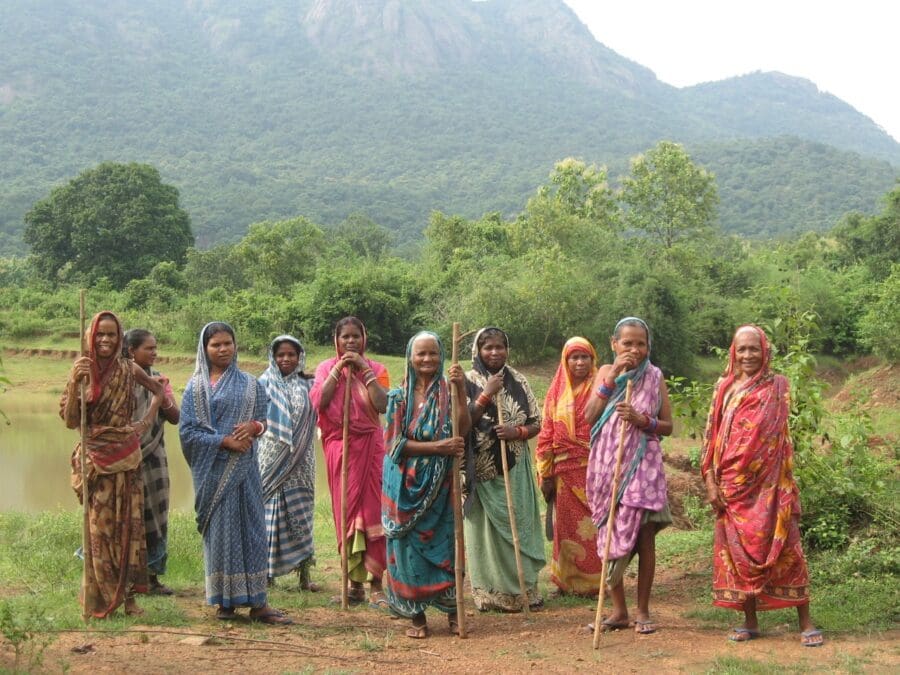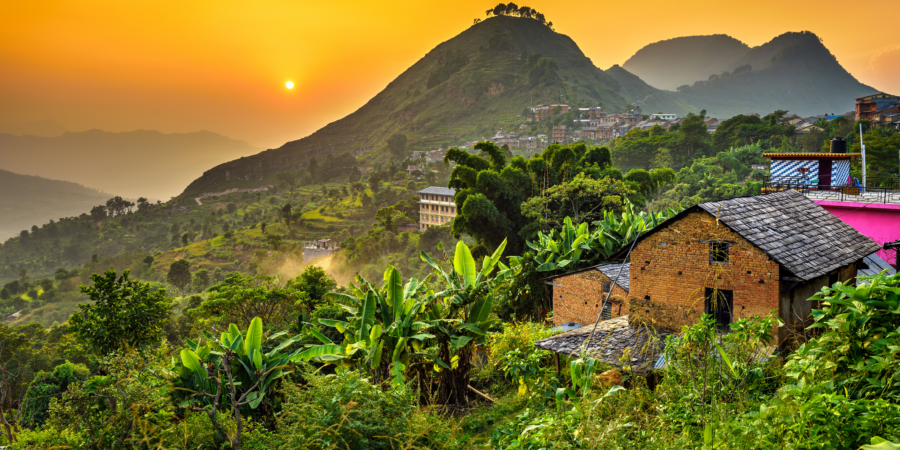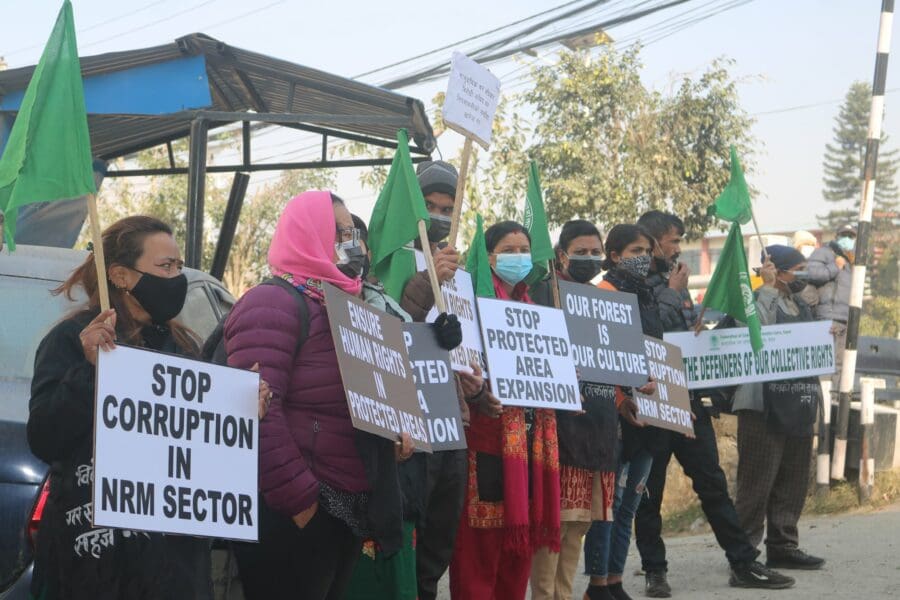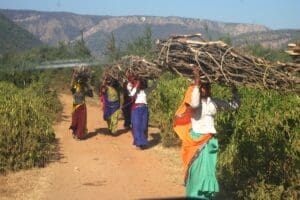-
- India’s greenhouse gas emissions rose 33% from 2010 to 2016. India is increasingly relying on land and forest-based climate change mitigation measures as an internal offset mechanism for its industrial emissions.
- India has robust legal frameworks on land and forest governance to enable rights-based and gender-responsive approaches to climate action. Several successful examples have emerged of community-led efforts of successful ecological restoration of degraded forests and protection of forests against drivers of climate change such as deforestation.
- Despite conserving forests for generations and contributing the least to global warming, India’s forest-dependent communities are at the frontline of climate disasters. To secure climate justice for these communities, the Indian government must recognize and support their rights to manage and govern the forests and ecosystems that sustain them.
To secure climate justice for India’s forest-dependent communities, the Indian government must recognize and support their rights to manage and govern the forests and ecosystems that sustain them.
A new policy brief that analyzes the implications of India’s climate actions from forests has revealed that the Indian government is increasingly relying on the land and forest sector to enhance carbon sinks as an internal offset mechanism for its greenhouse gas emissions. Drawing upon global evidence and recommendations of the Intergovernmental Panel on Climate Change (IPCC) which suggests that recognition of forest rights and decentralized land and forest governance deliver better climate and livelihood outcomes, the study found that India’s climate action policies and plans do not reflect these developments.
Instead, India is pursuing large-scale afforestation and reforestation—mostly monoculture—to enhance its forest cover and meet its carbon sink commitments. But these climate change mitigation measures are coming up on common lands and forests without any consideration for the legal and constitutional rights of communities dependent on them. Land conflicts are increasing as a result of these measures and the food and livelihood security of these communities have been threatened, making them more vulnerable to the climate crisis.
“Afforestation and reforestation programmes have received a massive flow of financial resources with funds over USD $10 billion allocated by the central government to states over the last five years. But land is so scarce that even compensatory afforestation, which is supposed to come up on non-forest land, is increasingly being taken up on forest lands. Our study found that degraded forests constituted 75% of the total land under compensatory afforestation in the last five years,” said Shruti Agarwal, one of the study authors.
“The IPCC report has warned that such large-scale, land-based mitigation measures will compete with existing land uses and adversely impact food security, ecosystem services, and adaptive capacities of communities. We are already seeing these impacts in India’s forestlands.”
“Forest-dependent communities have been conserving forests for generations and have contributed the least to global warming. Yet they are at the frontline of climate disasters such as forest fires. Climate change will impact them disproportionately, especially women,” said Tushar Dash, one of the study’s co-authors.
“If mitigation actions also have adverse impacts on their lives and livelihoods, it will be denying climate justice to them. It is imperative for India to have an alternative paradigm to climate action which is based on rights and justice.”
Fortunately, the study also found that a robust legal framework exists to enable a rights-based and gender-responsive approach to climate action from forests. This is the Scheduled Tribes and Other Traditional Forest Dwellers (Recognition of Forest Rights) Act 2006, also called the Forest Rights Act (FRA). The Act legally empowers forest dwellers to manage and govern nearly 40 million hectares of India’s forests. Several examples have emerged where communities have exercised these rights to successfully protect their customary forests from deforestation and carry out ecological restoration.
Instead of a ‘one-size-fits-all’ approach that forest bureaucracies tend to use for forest management, forest dwellers are adopting innovative and sustainable measures to manage and restore their forests which are based on their deep-rooted understanding of the land and their socio-cultural practices.
“Indigenous and local knowledge and practices have a crucial role to play in climate change mitigation and adaptation,” said Soumitra Ghosh from the All India Forum of Forest Movements.
“The Indian government must support forest dwellers to unleash their creativity and knowledge in democratic and autonomous forest governance through the full recognition of their rights and the development of FRA-based climate action plans on forestlands. It is the best shot India has to building resilient forests and communities and secure climate justice for its forest dwellers.”
A climate justice framework for forest-dependent communities
Securing climate justice for the marginalized and most vulnerable communities is imperative for India. Bureaucratic and market-based approaches to climate action have not worked. Community-led initiatives are showing promising results, globally and within India. FRA provides an enabling framework for an alternative paradigm to achieve climate-positive outcomes through the democratic governance of over 40 million hectares of India’s forests and the legal authority of forest-dependent communities to be at the core of decision-making in climate change mitigation and adaptation strategies.
To achieve this, India should prioritize the following:
-
- Develop a Forest Rights Act-based climate action plan that includes the full recognition of the rights of forest-dwelling communities and community-led governance of forests as an integral part of these plans and strategies to fight climate change.
- Secure tenure of Scheduled Tribes and Other Traditional Forest Dwellers on forestlands in India by scaling up the recognition of community forest resource rights.
- Support Scheduled Tribes and Other Traditional Forest Dwellers to exercise their forest rights in the letter and spirit of the FRA to build resilient forests and communities.
- Ensure Free, Prior and Informed Consent (FPIC) of Gram Sabhas for the implementation of climate change mitigation programmes on their customary lands and forests.
- Direct climate finance towards strengthening forest rights and tenure and ensure devolution of the climate funds to the Gram Sabhas under the FRA.
Read the full policy brief here. For questions, please contact Laura Valencia.
Interested in receiving notifications about new blog posts? Subscribe to The Land Writes Blog now to get new posts delivered right to your inbox.









